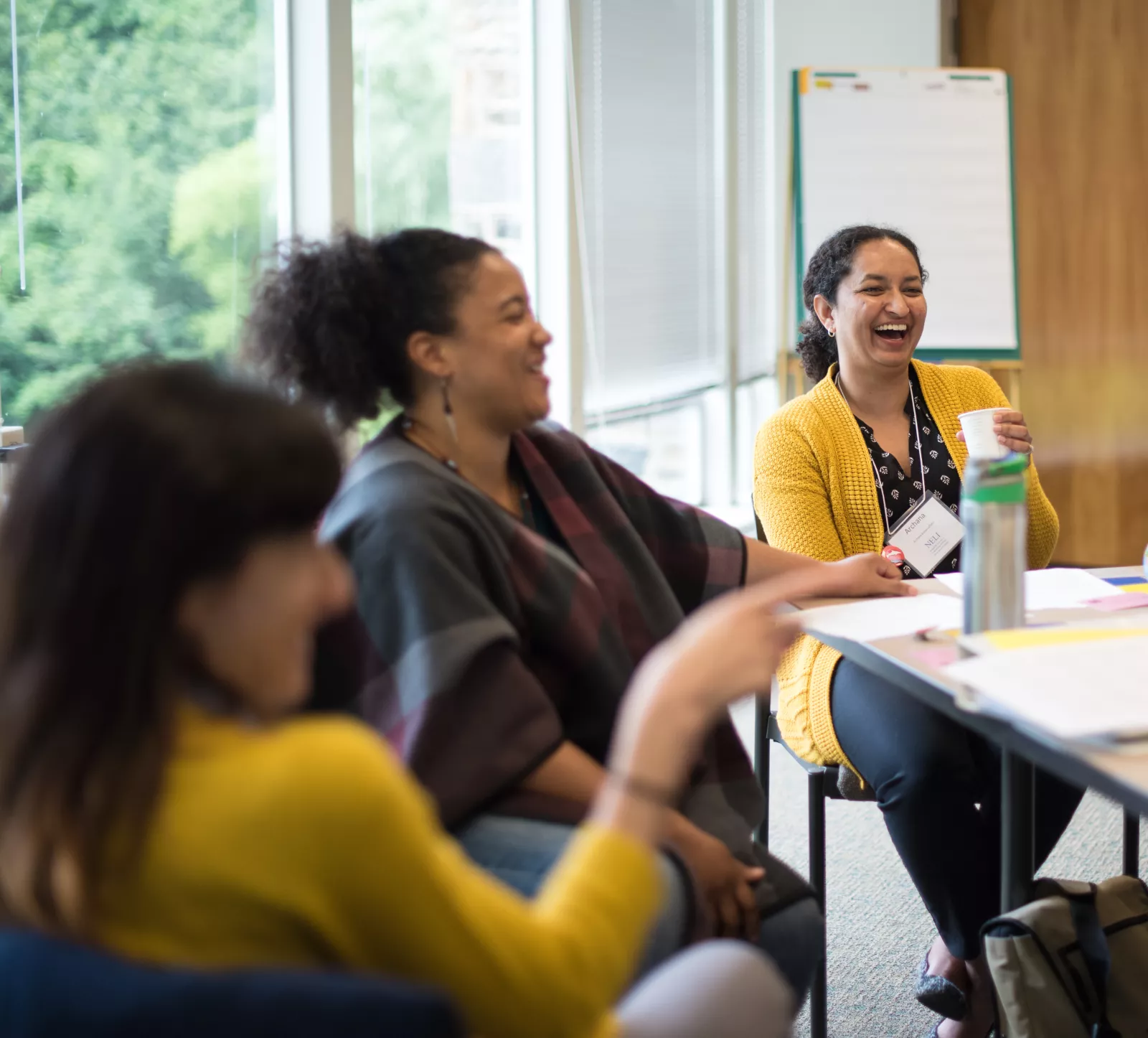
Leading with Impact: Nonprofit Executive Certificate
Starting at $3,500 | Application Required | Hybrid
Starting at $3,500 | Application Required | Hybrid
We developed the Leading with Impact: Nonprofit Executive Certificate to empower you on your leadership journey. Our program is designed to challenge both experienced and new leaders to enhance their skills and immediately apply what they learn.
Dates
Application Deadline:
Thursday, March 20, 2025
Program Dates: All training days run from 9 a.m. to 1 p.m.
Thursdays and Fridays: April 10, 11; April 24, 25; May 8, 9; June 5, 6
Wednesday and Thursday: May 21, 22
Delivery: Hybrid (In-person and Online via Zoom)
APPLY Attend an Information Session
About the Program
CURRICULUM Schedule Faculty & Coaches
One of the most formidable challenges Nonprofit leaders face is navigating the delicate balance between fulfilling the organization's mission and addressing the complex and ever-evolving needs of their constituents while managing with limited resources.
We created the Leading with Impact: Nonprofit Executive Certificate to support your leadership journey. Our curriculum challenges both seasoned and new leaders to advance their skills and put the information learned into immediate practice. We offer training in new theories and core skills that are critical to your organization’s long-term sustainability. You’ll learn how to inspire impact through high-level strategic thinking, board development, finance, and management.
We ask you to examine and expand your practices in strengthening diversity, equity, and inclusion across all elements of your organization. Our cohort-based model enables Fellows to integrate and test new techniques, then discuss the results with their peers.
Our faculty have years of experience in their fields and a deep understanding of the realities of nonprofit life. They encourage innovation and experimentation.
Join a strong community of peers, who assist one another and challenge each other to grow in their impact and beyond!
Who Should Apply
Nonprofit and Social Sector professionals in executive and senior management positions. Middle managers whose work carries a high level of organizational responsibility (i.e. whose roles focus on the organization as a whole).
Curriculum
The Core Curriculum includes 10 half-day seminars where you will:
- Assess how your leadership style impacts your organization’s ability to adapt, survive, and thrive during times of change.
- Discuss how transition and change affect your team’s well-being and morale, its group dynamics, and overall staff flexibility and productivity.
- Utilize a strategic thinking and planning model that works well for both short-term and long-term planning. Learn applications that help you analyze your business model and assess your changing environment and constituencies you serve. Then define key sustainability questions your organization is facing and develop outcomes-based strategies to address them.
- Understand how to create and support organizational teams. Develop skills essential to responding to threats and opportunities both internal and external to your social sector organization.
- Develop a deeper understanding of the interconnection between individual trauma and organizational trauma. Increase awareness of agency/organization-based trauma-informed practices and assessment tools. Develop and cultivate strategies to build organizational resiliency and post-traumatic growth.
- Learn how your Board’s developmental stage plays an important part in its practices in governance. Invite a Board Officer to this session to discuss the Board’s role in navigating transition and change.
- Assess your organization's financial management practices and its efforts to increase financial literacy in-house. Discover and test tools that can strengthen your financial decision-making and sustainability.
- Evaluate your organizational culture to learn where your organization stands in terms of its norms and practices that show respect for diversity, encourage inclusion, and integrate equity into its values and behavior. Learn best practices in Inclusive Leadership to help your organization move to the next level.
Create a Plan for an Impact Blueprint
Identify an internal systemic change that addresses a pressing organizational need. Present an Impact Plan that identifies key stakeholders in the organization and community and how you will work together to address the challenge.
Participate in a Peer-Led Learning Community
NELI is cohort-based, because we want you to learn as much from one another as from our trainers by discussing problems and seeking solutions. NELI grads praise their learning communities for evolving into trusting, non-judgmental environments that allow them the freedom to discuss their issues as leaders in strict confidence. The Learning Communities connect outside of the program's scheduled sessions and meet around your schedule.
Optional: Complete a Leadership Self-Assessment followed by Executive Coaching
Using a leadership 360-process, you will collect feedback on your leadership style from your staff, peers, and supervisors and compare their observations to your perception of your leadership style. You will be matched with a highly experienced executive coach who will then work with you individually to give context for that feedback. In addition, you may work with your coach on organizational opportunities and challenges you are facing, or on your individual career goals.
Schedule
- Faculty: Margie DuBrow, PhD
- Change is external, such as new executive leadership, new organizational policies, or movement into a new site. Transition is internal, the process we go through to adapt to these new situations. During this workshop, you will gain a deeper understanding of your leadership style and how it impacts the way you respond to transition and change. We will also identify the potential effect of change on your team’s morale, their flexibility and productivity.
- Faculty: Margie DuBrow, PhD
- Traditional strategic planning has focused on generating a three-year plan that sets clear goals and objectives, yet such plans often do not define strategies that will achieve measurable outcomes. Using David La Piana’s model called The Nonprofit Strategy Revolution, we will apply tools that help you analyze your business model, assess trends in your market, and identify your competitive advantage. You will then define key sustainability questions your organization is facing and develop outcomes-based strategies to address them. We will also generate ways to gather input from the communities we serve, so their voices and values are integrated into our work.
- Faculty: Margie DuBrow, PhD
- Traditional strategic planning has focused on generating a three-year plan that sets clear goals and objectives, yet such plans often do not define strategies that will achieve measurable outcomes. Using David La Piana’s model called The Nonprofit Strategy Revolution, we will apply tools that help you analyze your business model, assess trends in your market, and identify your competitive advantage. You will then define key sustainability questions your organization is facing and develop outcomes-based strategies to address them. We will also generate ways to gather input from the communities we serve, so their voices and values are integrated into our work.
- Faculty: Darlyne Bailey, Ph.D., ACSW, LISW & Sarah Spath, MFA, MSS
-
Fellows will learn two frameworks to assist in creating and supporting organizational teams addressing the Big Question identified during the strategic planning sessions of this Leadership series. The “Four Phases of Strategic Alliance Development” clarifies how to navigate the process of developing an effective alliance even when it is within one organization.
The “ARC” framework helps identify the roles that stakeholders can have in the process, with different levels of engagement with the Big Question. When used together these frameworks provide opportunities for furthering the development of skills essential to responding to threats and opportunities both internal and external to our social sector organizations.
- Faculty: Reggie Jones, LCSW, MSS, MLSP
- Each of us has been touched in some way by the global pandemic and these experiences are often interconnected to other traumas, including but not limited to, vicarious trauma and communal/historical trauma. This workshop will support NELI participants to deepen their understanding of trauma-informed practices, strategies to support the mitigation of organizational trauma, and increase opportunities for post-traumatic growth.
- Faculty: Fernando Chang-Muy, JD
- Understand how your Board’s developmental stage plays an important part in your Board’s practices in governance, ranging from its methods in recruitment and retention to how well leaders understand their roles and responsibilities. Invite a Board Officer to join the discussion regarding the Board’s role in navigating transition and change.
- Faculty: Danie Greennwell, PhD
- Assess your organization's financial management practices and its efforts to increase financial literacy in-house. Discover and test tools that can strengthen your financial decision-making and sustainability. Bring your CFO or Treasurer to share their experience and insights.
- Faculty: Danie Greennwell, PhD
- Assess your organization's financial management practices and its efforts to increase financial literacy in-house. Discover and test tools that can strengthen your financial decision-making and sustainability. Bring your CFO or Treasurer to share their experience and insights.
- Faculty: Tiffenia Archie, PhD
- Evaluate your organizational culture to learn where your organization stands in terms of its norms and practices that show respect for diversity, encourage inclusion, and integrate equity into its values and behavior. Learn best practices to help your organization move to the next level.
- Facilitator: Quanisha Green, MSS
- Present your Impact Plan that outlines an internal systemic change that addresses a pressing organizational need, identifies key stakeholders in the organization and community, and describes how you will work together to address the challenge.
Program Fees and Scholarship Options
Leading with Impact has Two Tuition Levels:
Tier One- Courses Only: $3,500
Tier Two- Courses + 360 Leadership Self-Assessment with Executive Coaching: $5,000
NELI receives money from funders who support the work of organizations in the Philadelphia five-county area and in southern New Jersey.
We raise scholarship funds from funders who support the work of nonprofit organizations in the Philadelphia five-county area and in southern New Jersey. Organizations are only eligible for scholarships if they have offices and serve clients in one of these areas. NELI Scholarships are contributed by the United Way of Greater Philadelphia and Southern New Jersey, as well as by individuals and other local, small foundations. A limited number of scholarships are reserved for participants with the greatest need.
Two local funders offer support to nonprofit leaders pursuing professional development. At the same time you apply to NELI, you may also submit an application to the funders listed below.
TD Charitable Foundation
Through its Nonprofit Training Resource Fund, nonprofit organizations can receive a grant for approved training to increase their organization’s capacity and skill set. The maximum grant is for $1,000. Applications are rolling.
The Valentine Foundation
The foundation’s Visionary Leadership Fund is committed to supporting leadership development for aspiring and executive women leaders of nonprofit organizations that improve the lives of women and girls in the Greater Philadelphia region.
The foundation prioritizes funding of organizations and executive and emerging leaders who are Black, Indigenous and People of Color and women, trans, and gender-expansive people.
How to Apply
Instructions for Applicants:
Make sure you can attend all 10 sessions.
- Review all questions on the Application Form (view/print out a blank copy here).
- Collect all the information you will need BEFORE you go online to complete the form. There is no save and return option.
- Materials needed for upload:
- Application Essay
- Resume
- Scholarship Essay
- Complete the Application Form.
Instructions for Nominators:
Applicants are required to have a direct supervisor or an individual who can speak to their work as a professional fill out a nomination form.
Bryn Mawr College Graduate School of Social Work and Social Research is a Council on Social Work Education accredited school and therefore, a Pa. pre-approved provider of social work continuing education. These credit hours satisfy requirements for L.S.W./L.C.S.W., L.P.C., and L.M.F.T. biennial license renewal. Social workers outside of Pennsylvania or other licensed individuals should contact their regulatory board to determine course approval.

